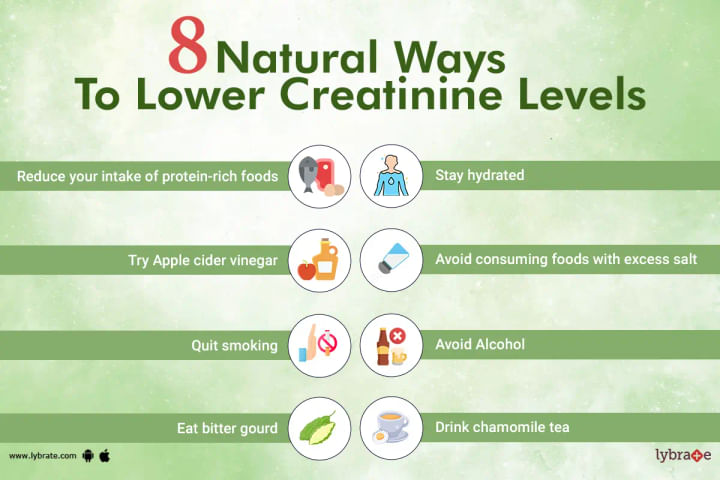8 Home Remedies to Naturally Lower Your Creatinine Levels
Creatinine can be best defined as an organic compound that's produced as a waste product when your muscles are used. Apart from that, eating lots of protein can also generate small amounts of creatinine in the body. In other words, creatinine is a muscle waste product that the kidneys are responsible for removing from the body and is found in a person's blood and urine.
As we already know, creatinine is a waste product that's generated from muscle metabolism. It is then transported to your kidneys through the bloodstream, where it can be filtered out and eliminated through your urine. And if your kidneys aren't working properly, creatinine levels in your blood can rise, which can further lead to some serious health issues.
Your doctor or healthcare provider may check your blood and urine for creatinine as part of an evaluation of your kidney health. Furthermore, it should also be noted that the normal level of creatinine in your blood or urine usually depends on a number of factors, including your age, race, gender, and body size. Abnormal creatinine levels in your blood may be an indicator of a kidney disease.
Creatinine levels can also be increased due to a variety of other reasons, including:
- Diabetes
- Tumors
- Infections such as hepatitis B and C, HIV, and syphilis (among others)
- Systemic lupus erythematosus, also known as SLE or just 'lupus'
If high creatinine levels are found through a blood or urine test, the doctor will likely order additional tests to identify the cause.
If you have high creatinine levels in your blood, it's important to seek medical help so that you can create a treatment plan to address any health issues that may be causing damage to your kidney function. Along with your medicines and other treatments, ask your healthcare provider whether the following lifestyle changes are appropriate for you. If you're looking for ways to lower your creatinine levels naturally, here are eight home remedies that might help:
Reduce your intake of protein-rich foods
Studies have shown that consuming large amounts of protein can lead to an increase in creatinine levels, at least temporarily. In particular, cooked red meat can affect creatinine levels. The heat from cooking causes the creatine found in meat to produce creatinine.
People who eat a lot of red meat, dairy, or other protein-rich foods may have higher creatinine levels than those who eat less of these foods. If you eat a lot of red meat, try switching to more vegetable-based dishes. You could swap out your beef burgers for food items such as:
- Vegetable patties
- Hearty vegetable stew
- Lentil soup
Make sure you're not dehydrated
Creatinine levels in the blood can also increase when a person is dehydrated, which can lead to symptoms such as a dry throat, dizziness, and fatigue. If severe, dehydration can put strain on the cardiovascular system and other organs, and in extreme cases, it can even be life-threatening. The best way to prevent or deal with dehydration is by drinking plenty of water or other healthy fluids.
However, for some people with kidney disease, fluid intake can be an issue. So, if that is the case with you as well, be sure to talk with your healthcare provider about how much water and other fluids you should drink daily, as well as the best time to drink them.
Apple cider vinegar is worth giving a try!
According to a study conducted in 2008, kidney stone formation may lead to a very small increase in serum creatinine levels (8). However, apple cider vinegar contains acetic acid, which may actually lower the risk of kidney stone formation.
Apart from that, apple cider vinegar has antimicrobial properties as well. This may help keep bacteria at bay, and it may also help prevent your blood creatinine levels from rising. However, there is a lack of scientific evidence to support these claims, but it is usually safe to consume apple cider vinegar in low or moderate quantities.
Avoid consuming foods with excess salt
Excess amounts of salt in our everyday meals can lead to high blood pressure, especially when consuming processed foods that often contain sodium and phosphorus additives. In recent studies, consuming foods high in these additives has also been linked to increased creatinine levels as well as other renal problems.
So, you must rather focus on eating whole, unprocessed foods and using healthy spices and herbs (rather than excess salt) to flavor your food when possible. By doing this, you will be keeping your kidneys healthy, which will eventually help regulate the creatinine levels in your blood.
Quit smoking without a second thought!
If you are a habitual smoker, you might notice an increase in your creatinine levels. This is a sign that smoking is gradually harming your kidneys, and it may even lead to complete kidney damage. In this case, one of the best things you can do to improve or maintain the health of your kidneys is to quit smoking as soon as possible.
Cigarette smoking is detrimental to one's health and can give rise to a number of health issues, including chronic kidney disease. That said, if you quit smoking, it can help you reduce your risk of developing high creatinine levels and other life-threatening kidney problems.
Avoid consuming too much alcohol (if you do)
Alcohol consumption can have mixed effects when it comes to kidney function. Some studies have suggested that moderate alcohol consumption may help reduce the risk of chronic kidney disease, while other studies have shown that alcohol consumption is associated with a higher risk of developing chronic kidney disease.
In other words, it is believed that excessive alcohol consumption can potentially lead to kidney damage, high blood pressure, and alcohol dependency, according to other studies.
All in all, we must understand and acknowledge the fact that too much of anything can be harmful. If you drink alcohol, it's best to consult with your healthcare provider about the safest levels for you specifically. This way, you can avoid any potential health risks associated with drinking.
Have you tried consuming bitter gourd to regulate your creatinine levels?
Bitter gourd is a nutrient-rich vegetable that contains high levels of minerals, vitamins, antioxidants, and fiber. Some people believe that bitter gourd can act as a natural diuretic, helping to improve blood circulation and kidney function. This can further help to regulate your creatinine levels as well.
Bitter gourd juice has many potential health benefits, but it's important not to consume too much. According to a recent study, the tolerable range is 4000 mg/kg. Any amount or dose that exceeds this limit may be nephrotoxic, or harmful to the kidneys.
Drinking chamomile tea can do wonders for your renal health
Chamomile tea has been shown to reduce elevated creatinine levels. To make the tea, you will have to add the chamomile herb (or tea leaves) to a cup of boiling water. Thereafter, you must let it steep for at least 10 to 15 minutes before you finally strain it. You also have the option to add a few drops of honey to your tea for a better or enhanced taste, if desired.
In fact, this tea can be amazing for your overall health! Not only does it taste great, but it can also help lower your creatinine levels (as mentioned above). You can drink this great tea three to four times a day, so what's stopping you from giving it a try?
Conclusion:
We hope you enjoyed our article on how to lower creatinine levels naturally. There are many ways to naturally lower creatinine levels, and we hope that this article was able to provide you with some great ideas and inspiration when it comes to things you can start doing today. As always, if you have any questions, queries, or concerns about this subject, please feel absolutely free to contact us anytime; we would indeed love to hear from you!



+1.svg)
